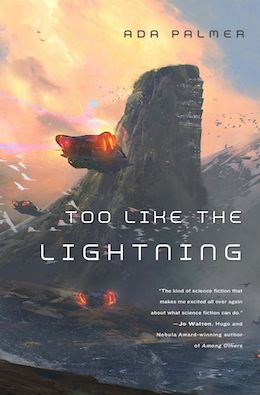Juliet: Well, do not swear: although I joy in thee,
I have no joy of this contract to-night:
It is too rash, too unadvised, too sudden;
Too like the lightning, which doth cease to be
Ere one can say ‘It lightens.’–Romeo and Juliet, Act II Sc. II
Homer and de Sade, Voltaire and Samuel Delany, Diderot and Alfred Bester: Ada Palmer’s Too Like the Lightning wears more than two thousand years of influences on its sleeve. It wears them lightly. From the author of Reading Lucretius in the Renaissance comes a devastatingly accomplished speculative fiction debut, an arch and playful narrative that combines the conscious irreverence of the best of 18th-century philosophy with the high-octane heat of an epic science fiction thriller.
Step up your game, science fiction. The competition is here, and it’s self-aware, wickedly elegant, and intoxicatingly intelligent.
But what, you might ask me, upon hearing this superlative praise, is Too Like The Lightning actually about?
People, politics, society, philosophy, theology, and what you’ll destroy to save your world—or a better one.
Mycroft Canner is our narrator: a Servicer, a criminal deemed harmless and sentenced to live a life of useful work according to the customs of the 25th century. The world in which Mycroft lives is familiar enough to be understandable and yet still an alien, inventive future. This complicated utopia, built on technological abundance, exists in a careful balance of forces: it survives in the absence of anything like a majority, and its inhabitants affiliate themselves with global bands of the like-minded, called Hives. The powers and princes of this world are not necessarily immediately obvious, and the outward rules may be inwardly broken. In a world where the public practice of religion is prohibited, the child Bridger—who can, it seems, make inanimate objects come to life, who can produce miracles—could be as destabilising a force to the peace as a threat to the world’s transport system.
Palmer’s narrator is a knowing—and unreliable—one. This isn’t a novel that pretends it exists without an audience. Mycroft adopts a self-consciously archaising tone, drawing occasionally on the style of the 18th century Enlightenment that their age takes, at least in part, as inspiration. Their attitudes, in combination with the assumptions of their 25th century, give some elements of elegant mindfuck to the narrative. This is an extraordinary voice, versatile and engaging, arch and wry: deceptively straightforward.
(I’d call Palmer’s approach unapologetically baroque, were it not for the fact that every throwaway decorative line comes around to supporting something significant.)
So many excellently well-drawn characters. Such a sly and clever sideways interrogation of our categories of gender. Such an elegantly blasphemous—though one might say iconoclastic and be just as accurate—approach to religion and society. Too Like The Lightning isn’t a didactic novel. Instead, it presents certain things—certain themes—and invites engagement. Invites argument, without being argumentative. Let me argue with your philosophy and philosophers, your histories, your world!
Ravishingly, uncompromising, deceptively intelligent, this is a book that combines the appeal of Jo Walton’s The Just City and Ann Leckie’s Ancillary Justice with the furious complexity of Max Gladstone’s Craft novels. But it’s nothing like them, exactly. It’s resolutely its own thing: one part theology to nine parts political and personal thriller.
The single complaint I have about it, in fact, is that it is only one half of a whole: part one of two, and the second part, Seven Surrenders, will not be with us until December. I cannot wait that long to see how Palmer solves this gloriously complicated narrative equation: I can’t imagine that she’ll fail to stick the dismount, but damn do I want to see how she succeeds.
I want to see it right now.
Too Like The Lightning is an excellent novel. If it doesn’t show up for award consideration next year, I’ll be very surprised. It’s good—and it’s only Palmer’s debut. If this is how she starts, I’m going to seriously enjoy the rest of her fiction career.
Too Like the Lightning is available now from Tor Books.
Read an excerpt from the novel here on Tor.com.
Liz Bourke describes herself as a cranky person who reads books. She holds a doctorate in Classics from Trinity College, Dublin. Find her at her blog. Or her Twitter.











Oh, Liz, why do you do this to me?
Did you really have to push all my buttons?
I’d say sorry, but I’m not. *g*
Regarding buying this book as an ebook here in the UK, I am rather frustrated. I can’t seem to find an online store which sells it. The UK Nook store no longer exists, iBooks only has the audio book, and Kobo doesn’t have it. Help!
Been reading about this book a lot lately, and I really really want to buy it.
But.
Somehow, the ~ 16 $ it cost as an ebook in the US (bit pricey, but hey, I can afford 15 €) get translated to ~ 15 pounds, which is about 22 €.
So, for the priviledge of reading the same digital content in the EU I get charged.7 € more.
I’m sure the author doesnt have anything to do with this but really, really, it is abusive. Probably will wait till book is paperback to see what the cost of the ebook is.
Get the hardcover. The ebook doesn’t have the typographical games Palmer mentions in her acknowledgements. (Don’t wait for the paperback, because a) what if that makes the book fail! and b) this is as good as Liz says it is.)
Sounds like good arguments but I have to weight that against my girlfriend’s desire not to have her house invaded by all my books :P
For similar reasons to Jesús, I want the ebook. But I can’t purchase it from Barnes&Noble – because they don’t have a UK store, and they won’t allow digital purchases from a non-US address. Does anyone have any suggestions as to where I might buy it?